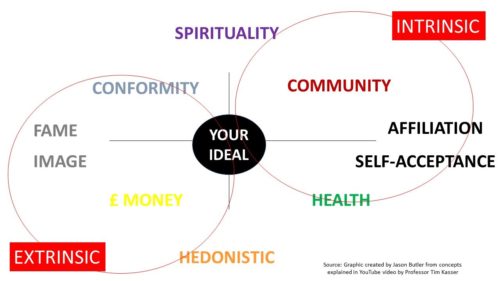
By JASON BUTLER
At a basic level, humans are motivated by the desire to avoid pain or to gain pleasure, and research shows that our desire to avoid pain is twice as much as our desire to gain pleasure.
But when it comes to spending money there are so many temptations and opportunities that can cause us to lose control of our day to day spending, which can lead to the very pain we are keen to avoid.
Professor Tim Kasser has authored over 120 scientific articles and book chapters on the role of materialism and consumerism on overall financial wellbeing and environmental sustainability. I can highly recommend his books The High Price of Materialism and HyperCapitalism: The modern economy, its values, and how to change them (with Larry Gonick).
Professor Kasser explains how our sense of identity and ideal of who we think we are or who we want to become, influences our activities in four areas: Our desire or need to CONFORM to social norms and beliefs; our sense of COMMUNITY and affiliation to others; our mental and physical HEALTH; and our relationship with and use of MONEY and financial assets.
Those people who have high extrinsic motivation tend to be more pleasure seeking – hedonistic – and seek fame and acceptance of others. Or put another way, they use money and make work and financial decisions based on what other people might think of them, with the aim of achieving status and external validation.
Professor Kasser advises that people who have high extrinsic motivation tend to feel emotional insecurity and be less mentally resilient. For many people this is due to their emotional needs not having been met in their childhood, while for others it could be due to hormonal imbalances or having suffered a major emotional trauma.
Whatever the cause, high extrinsic motivation usually manifests itself in the form of spending money on things that don’t maintain or improve one’s financial wellbeing – expensive cars, big houses, exotic holidays, unnecessary possessions, fashionable clothes, beauty products or jewellery – and that often have a negative impact on the environment.
People who have high intrinsic motivation tend to be more emotionally secure and have a greater sense of connection with other people and their community. Their spending tends to be focused on living a life based on what makes them truly happy and is aligned with what is important to them, rather than seeking the approval or acceptance of others. These people are said to be values led.
None of us can change our childhood or our genetics but we can take a good long look at how we live, including how we spend our money, and whether this is making us fulfilled and content.
Ask yourself this one question: If you were the only person in the world, and assuming you could get over the loneliness and everything still worked – food, energy, shelter and water – would you still wear the same clothes, drive the same car, take the same pictures, have the same hair style, use the same beauty products, eat the same food, or go on holiday?
Life is a precious gift. Make sure that you spend your money in a way that serves you well, and that is in tune with what is truly important to you.
JASON BUTLER is a former financial adviser, based in Suffolk. He is a personal finance columnist for the Financial Times, and is Head of Financial Education at Salary Finance. You can find out more about him on his website.
Jason is a regular contributor to TEBI. Here are two of his recent articles you may have missed:
An emergency fund is a necessity, not a luxury











